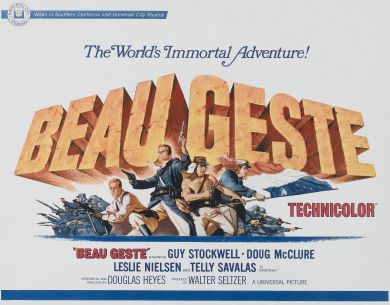
BEAU GESTE
US, 1066, Colour.
Guy Stockwell, Telly Savalas,
Beau Geste was one of the most popularly read adventures of the early 20th century. The story of British honour by P.C.Wren and the life in the Foreign Legion has appealed over the decades. First filmed with Ronald Colman as a silent film in 1926, the classic version is this one produced and directed by adventure director William Wellman. Gary Cooper was a strong hero, though lacked the light touch for Beau. Ray Milland and Robert Preston early in their careers, were his enthusiastic brothers. Susan Hayward is in an early role as Isabel. Brian Donlevy was quite effective as the sadistic Markoff.
Rousingly filmed with a straight-out emphasis on adventure and honour, the film seems somewhat dated for more sophisticated tastes. However it embodies the ideals of action adventure of the time e.g. George Stevens' Gunga Din. Remade in the '60s with Guy Stockwell and Telly Savalas, it altered many details of the original plot. It was the target for satire by Marty Feldman in the 1977 The Last Remake Of Beau Geste. This film was a mixture of the clever and the silly but did highlight many of the aspects of the original and even included some of the footage with Gary Cooper.
1. P.C. Wren's books and their place in the literary tradition of the twentieth century? The film versions and the tradition of Ronald Colman and Gary Cooper? How well did this film fit into the tradition? Audience expectations and fulfilment?
2. The legendary fascination of the Foreign Legion? Romance and reality? audience enjoyment of the Legion adventures?
3. The importance of Techniscope and colour, desert location? Music?
4. The importance of the writer- director truncating the novel? Eliminating the family background and the reasons for the Gestes being there? The playing with the name? Americanising the situations? The importance of the flashback structure at the fort and the revelation of the background and heroism? Effective for adventure entertainment?
5. The presentation of life in the Legion? Training, sadism, fighting, heroics? Realistic, fantasy?
6. Beau and his background, the explanation of his presence, the
visualising, of his presence especially with Dagineau and his
initial review of the Legionnaires? His becoming the victim of Dagineay while the hero with the others? The plausibility of his presence and the revelation by the commander?
7. The presence of John, his following his brother, hero worship, becoming a victim of Dagineau? The bonds between the two brothers? The explanation of their presnece in the Legion?
8. Characterisation of Dagineau? Credible? Sadistic,a good soldier? His review of the troops and treatment of them? The importance of the death threat letter? His trying to find out the writer? His drill? Cruelty? Lashing of Beau Geste? encounter with the commander? Getting Baldini as his aide? His being attacked by his own men? Strung up,saved by Beau Geste? His valet in the attacks? The final duel and his death? A credible portrait of a sadistic man?
9. The contrast with the commander,career and aristocracy? His drinking, attitude towards Geste and knowledge of him? His leading his men, being wounded? The author of the letter? His death?
10. Baldini as the toadying type, his liaisons with the men, his attachment to Dagineau? The inevitability of his violent death?
11. The glimpses of the other men, the German, the French? Their reasons for being in the Legion? The Polish priest? Their being united in enmity,vengeance against Dagineau?
12. The sense of cruelty, training, digging in the heat? The tavern sequence” The plot and the revolt? The deaths of the men?
13. The dramatic impact and visualising of the battle sequences? The final battle and the men against the wall, the Geste’s heroism and John's heroism? Dagineau's death? Beau's explanation of what had happened?
14. Enjoyable adventure? Heroics?